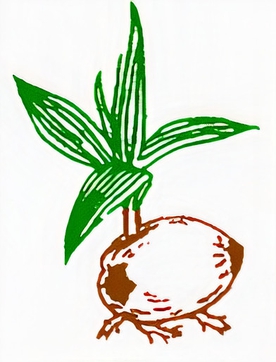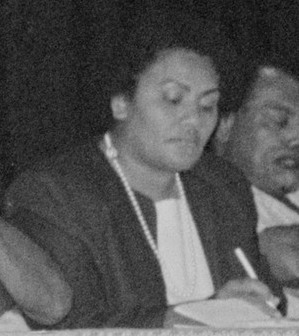
The Fiji Labour Party, also known as Fiji Labour, is a political party in Fiji. Most of its support is from the Indo-Fijian community, although it is officially multiracial and its first leader was an indigenous Fijian, Dr. Timoci Bavadra. The party has been elected to power twice, with Timoci Bavadra and Mahendra Chaudhry becoming prime minister in 1987 and 1999 respectively. On both occasions, the resulting government was rapidly overthrown by a coup.

The United Fiji Party was a political party in Fiji. It was founded in 2001 by Prime Minister Laisenia Qarase as a power base; it absorbed most of the Christian Democratic Alliance and other conservative groups, and its endorsement by the Great Council of Chiefs (Bose Levu Vakaturaga) caused it to be widely seen as the successor to the Alliance Party, the former ruling party that had dominated Fijian politics from the 1960s to the 1980s. It drew its support mainly from indigenous Fijiians.

Adi Kuini Teimumu Vuikaba Speed was a Fijian chief and politician, who served as Deputy Prime Minister from May 1999 to May 2000.

General elections were held in Fiji in August and September 2001. The Soqosoqo Duavata ni Lewenivanua party won 18 of the 23 seats reserved for ethnic Fijians and one of three "general electorates" set aside for Fiji's European, Chinese, and other minorities. It also won 13 of the 25 "open electorates," so-called because they are open to candidates of any race and are elected by universal suffrage. The remaining five ethnic Fijian seats, and one open electorate, were won by the Conservative Alliance, one of whom was George Speight who had led the putsch against the lawful government the year before. Chaudhry's Labour Party won all 19 Indo-Fijian seats and eight open electorates. The New Labour Unity Party, formed by defectors from the FLP, won one general electorate and one open electorate. The three remaining seats were won by minor parties and independent candidates.

The Conservative Alliance was a right-wing political party in Fiji, and a member of the ruling coalition government. It was commonly known as the CAMV, a combination of the initials of its English and Fijian names. At its annual general meeting on 17 February 2006, the party voted to dissolve itself and merge with its coalition partner, the Soqosoqo Duavata ni Lewenivanua (SDL). The President of the party at the time of its dissolution was Ratu Tanoa Cakobau, a Bauan chief, while Ratu Josefa Dimuri served as General Secretary. For legal reasons, Parliamentary members of the disbanded party maintained a separate caucus in the House of Representatives, under the leadership of Ratu Naiqama Lalabalavu, until the end of the parliamentary term, on 27 March 2006.

The Fijian Association Party (FAP) is a former political party in Fiji. It played a significant role in Fijian politics throughout the 1990s, but lost all of its seats in the House of Representatives in the parliamentary election of 2001.

The Soqosoqo ni Vakavulewa ni Taukei (SVT), occasionally known in English as Fijian Political Party, was a party which dominated the politics of Fiji in the 1990s and was the mainstay of coalition governments from 1992 to 1999.

The People's National Party (PNP) is a former Fijian political party.

The Grand Coalition for Fiji, formerly known as the Grand Coalition Initiative Group, was a coalition of five predominantly indigenous Fijian political parties in Fiji, forged for the purpose of contesting the general election scheduled for 2006 under a single umbrella and forming a coalition government subsequently. Efforts to unite the ethnic Fijian parties were in part a response to their electoral defeat in 1999, when they had been split, enabling the Indian-backed FLP to win a landslide victory. Nevertheless, Tomasi Vakatora, the chairman of the Grand Coalition, publicly stated in February 2006 that it was open to sharing preferences with the predominantly Indian parties. By the time of the election, however, the coalition was virtually defunct.

General elections were held in Fiji between 6 and 13 May 2006.

Local elections in Fiji are held for two cities and ten towns. Each city or town has a council comprising between 8 and 20 members, elected for three-year terms, although the government announced legislation on 15 February 2006 to extend the term to four years. Each city or town council elects from among its own members a Mayor for one year. Consecutive terms are permitted.

Local elections were held in Fiji on 22 October 2005 to elect the councils of eleven municipalities. In Suva, the elections for the Suva City Council were postponed until 12 November due to the death of two candidates; the death of a candidate in Lautoka also resulted in the poll postponement in one of the four wards.

The Party of National Unity was a Fijian political party founded by Ratu Sairusi Nagagavoka in 1998; by the time of the military coup of 2006, Nagagavoka remained the President of the party. A well-known member of the party was Apisai Tora. Presenting itself as a multiracial party representing the interests of Ba Province in particular, it formed part of the Fiji Labour Party-led People's Coalition in the general election of 1999, and won four seats in the House of Representatives. It lost all of its seats in the following election, in 2001, but party stalwart Ponipate Lesavua was appointed to the Senate as one of 8 nominees of Opposition Leader Mahendra Chaudhry.
Pita Kewa Nacuva is a Fijian politician and former Fiji rugby union international. He served as Speaker of the House of Representatives from June to December 2006, when a military coup deposed the government and resulted in the dissolution of Parliament. Previously, he had served in the Cabinet as Minister for Tourism.
Konisi Tabu Yabaki was a Fijian politician from the southern Kadavu Island. He served in the Cabinet from 2000 to 2006, but lost his portfolios as Minister for Fisheries and Forests after the parliamentary election of 6–13 May 2006. He was subsequently appointed Chairman of the parliamentary committee on Social Services.
Joji Natadra Banuve was a Fijian politician, who served in the Cabinet as Assistant Minister for Local Government, Housing, Squatter Settlement, and the Environment. In the aforementioned roles, he assisted Colonel Pio Wong, who succeeded him in all of these portfolios.
Lekh Ram Vayeshnoi, is a Fijian politician of Indian descent. He was one of the youngest members to be elected into Parliament in 1992. He has represented the Nadroga Indian Communal Constituency, which he won for the Fiji Labour Party (FLP) in the parliamentary elections of 1992, 1994, 1999, 2001, and 2006. After the 1999 election he was appointed Assistant Minister in Prime Minister's Office. He was appointed Minister for Youth and Sports and Employment Opportunities in the interim administration that followed the military coup that took place on 5 December 2006. He was born to a family of Rajasthani descent.
John Ali is a Fiji Indian politician who won the Nasinu Rewa Open Constituency, one of the 25 open seats, for the Fiji Labour Party during the 1999 elections for the House of Representatives.
Josaia Waqabaca is a Fijian public figure and former political organizer, who turned police informant about the Fiji coup of 2000. Waqabaca was convicted and imprisoned in 2001 for plotting to kidnap the Military Commander, Commodore Frank Bainimarama, in 2000.



